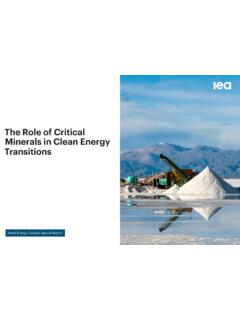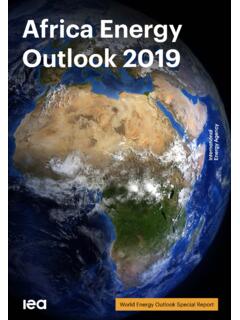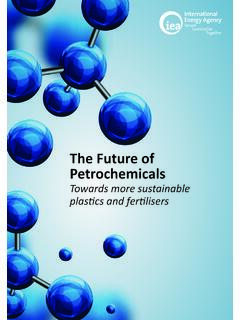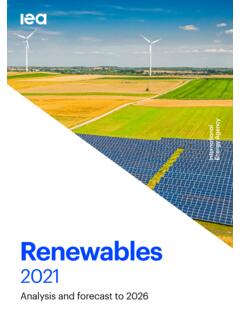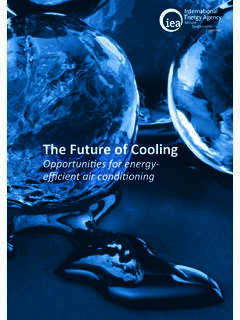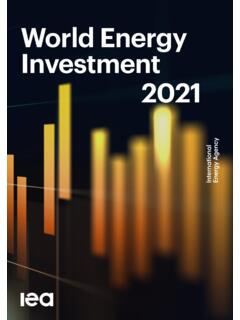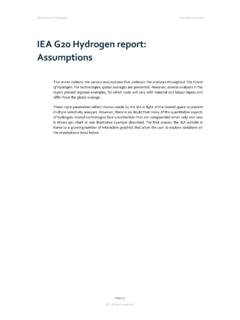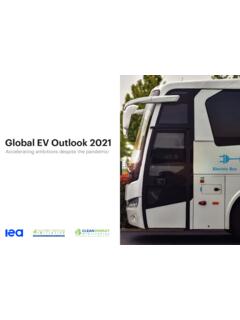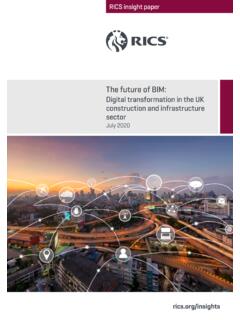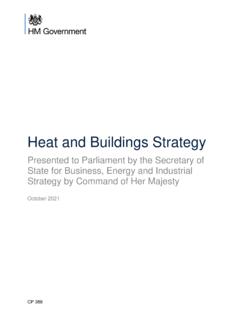Transcription of Empowering Cities for a Net Zero Future
1 Empowering Cities for a Net Zero Future :Unlocking resilient, smart, sustainable urban energy systemsEmpowering Cities for a Net Zero Future :Unlocking resilient, smart, sustainable urban energy systems Empowering Cities toward Net Zero Emissions Abstract Unlocking Resilient, Smart, Sustainable Urban Energy Systems PAGE | 3 IEA. All rights reserved. Abstract Climate action in Cities is essential for achieving ambitious net-zero emissions goals. Cities account for more than 50% of the global population, 80% of global GDP, two-thirds of global energy consumption and more than 70% of annual global carbon emissions. These factors are expected to grow significantly in the coming decades: it is anticipated that by 2050 more than 70% of the world s population will live in Cities , resulting in massive growth in demand for urban energy infrastructure.
2 Smart Cities represent an important opportunity to reduce energy consumption while meeting service demand, improving grid stability and improving the quality of life for all. Next-generation energy systems leverage big data and digital technologies to collect and analyse data in real time and manage city services more efficiently. These solutions are transforming the energy landscape by creating new synergies to reduce emissions, improve energy efficiency and enhance resilience. Local governments are in a unique position to deliver on the net-zero emissions agenda. In this report we illustrate the wide range of opportunities, challenges and policy solutions that can help city-level governments capture the significant value in efficient and smart digital energy systems, no matter their unique context.
3 Our focus is on ways national governments can help Cities overcome barriers to progress and accelerate clean energy transitions using digitalisation. Empowering Cities toward Net Zero Emissions Acknowledgements Unlocking Resilient, Smart, Sustainable Urban Energy Systems PAGE | 4 IEA. All rights reserved. Acknowledgements, contributors and credits The Empowering Cities toward Net-Zero Emissions report was prepared by the Energy Efficiency Division (EEFD) of the Directorate of Energy Markets and Security (EMS) of the International Energy Agency (IEA). This publication was produced with the support of the Italian Ministry of Economic Development.
4 The work also benefited from the contributions of the Italian Ministry for Ecological Transition as part of its ongoing support to the IEA Clean Energy Transitions Programme (CETP) and the Digital Demand-Driven Electricity Networks (3 DEN) initiative. The IEA also thanks the Italian Ministry for Foreign Affairs and International Cooperation for its strategic guidance and collaboration. Vida Rozite led and co-ordinated the analysis and production of the report. The main contributors were (in alphabetical order) Ahmad Al Mugharbil, Emi Bertoli, Ramit Debnath, Alyssa Fischer, Pauline Henriot, Ghislaine Kieffer, Doyob Kim, Luis Munuera, Alison Pridmore, Jeremy Sung, Monica Troilo and Molly Webb (Energy Unlocked).
5 Brian Motherway, Head of the IEA EEFD, provided strategic guidance and advice, and we are thankful to other senior managers including Keisuke Sadamori, Director of the IEA EMS Directorate for their support. Important inputs, comments and feedback were provided by the following IEA colleagues: Thibaut Abergel, Edith Bayer, Sylvia Elisabeth Beyer, Kieran Clarke, Chiara Delmastro, Astha Gupta, Peggy Hariwan, Maximilian Jarrett, Maxine Jordan, George Kamiya, Nathaniel Lewis-George, Rebecca McKimm, Alessio Scanziani, Disha Sharma, Melanie Slade, Jacopo Tattini, Jacob Teter, Alan Searl, Aad Van Bohemen and Jacques Warichet. The IEA would like to thank the following experts who provided essential inputs, review and encouragement.
6 Magdalena Aybar (Government of the City of Buenos Aires), Riccardo Amoroso (Enel X), Diona Apriliana (Bandung City planning department), Elisa Bastos (Brazilian Electricity Regulatory Agency [ANEEL]), Steven Beletich (Beletich Associates), Alberto Biancardi (Italian Energy Service Agency [GSE]), Pierre Bivas (Voltalis), Stefan Bouzarovski (University of Manchester), Will Broad (Department for Business, Energy and Industrial Strategy [BEIS]), Derik Broekhoff (Stockholm Environment Institute), Daniel Brooks (EPRI), Empowering Cities toward Net Zero Emissions Acknowledgements Unlocking Resilient, Smart, Sustainable Urban Energy Systems PAGE | 5 IEA. All rights reserved.
7 Britta Buchholz (Hitachi ABB Power Grids), Cristina Bueti (ITU, Smart Sustainable Cities ), Emilio Fortunato Campana (CNR), Alice Charles (WEF), Alessandro Chiodi (e4sma), Jordi Cipriano (Building Energy and Environment [BEE] Group), Bram Claeys (Regulatory Assistance Project), Russ Conklin (US Department of Energy [DOE]), Ynse de Boer (Envision Digital), Priscilla de Comarmond (City of Cape Town), Ercole De Luca (ARETI), Ilan Cuperstein (C40), Diona Cynantya (Bandung City), Gilberto De Martino Jannuzzi (International Energy Initiative), Rocco Demiglio (e4sma), Michele de Nigris (RSE), Andy Deacon (Global Covenant of Mayors for Climate and Energy [GCoM]), Iain Docherty (Stirling University), Lean Doody (Arup), Mark Dyson (Rocky Mountain Institute), Gabriela Elizondo (World Bank Group), Megan Euston-Brown (Sustainable Energy Africa), Mostafa Fallahnejad (Institute of Energy Systems and Electrical Drives), Anggarani Fatmawati (Greater Jakarta Transport Authority), Gabriel P.
8 Fla o (Ministry of Energy of Chile), Robert Friel (Energy Unlocked), Yann Fromont (Schneider Electric), Maurizio Gargiulo (e4sma), Chirag Gajjar (World Resources Institute), Hlonela Gesha (City of Cape Town), Claudia Gibbard (BEIS), Kirsten Glennung (European Distribution System Operators [EDSO] for Smart Grids), Corey Glickman (Infosys), Giorgio Graditi (Italian National Agency for New Technologies, Energy and Sustainable Economic Development [ENEA]), Paris Hadfield (Melbourne University), Ian Hamilton (UCL Energy Institute), Nikos Hatziargyriou (National Technical University of Athens [NTUA]), Shan Hu (Tsinghua University), Lawrence E.
9 Jones (Edison Electric Institute), Emily Judson (University of Exeter), Soo-Jin Kim (OECD), Klaus Kubeczko (Center for Innovation Systems & Policy, Austrian Institute of Technology [AIT]), Ankit Kumar (University of Sheffield), Massimo La Scala (Politecnico di Bari), Arun Kumar Mishra (National Smart Grids Mission), Nadia Maki (ANEEL), Massimo Maraziti (Directorate General for Energy, European Commission), Luca Marchisio (TERNA), Peter Markussen (Energinet), Rodolfo Martinez (Iberdrola), Tadashi Matsumoto (OECD), John Mayernik (NREL), Vincent Minier (Schneider Electric), Juan D. Molina Castro (Colombia Inteligente), Antonello Monti (RWTH Aachen University), Xavier Moreau (AlterGrids), Miguel M sca (BABLE), Mario Motta (Politecnico di Milano), Catherine Mulligan (Imperial College), Yacob Mulugetta (University College london , Department of Science, Technology, Engineering & Public Policy), Guglielmina Mutani (Politecnico di Torino), Rushad Nanavatty (Rocky Mountain Institute), Vaishali Nandan (German Society for International Cooperation [GiZ]), David Nemtzow (US DOE), Clay Nesler (World Resources Institute), Monica Neukomm (US DOE), Yudhistira Nugraha (Jakarta Smart City), Cathy Oke (GCoM)
10 , Sergio Olivero (Politecnico di Torino), Atsuhito Oshima (OECD), Selenia Ediyani Palupiningtyas (Greater Jakarta Transport Authority), Ngura Pasek (Regional Development Planning Agency/Bappeda Bali), Andres Empowering Cities toward Net Zero Emissions Acknowledgements Unlocking Resilient, Smart, Sustainable Urban Energy Systems PAGE | 6 IEA. All rights reserved. Pinto-Bello (European Business Association for Digital and Decentralised [smartEn]), Ganjar Setya Pribadi (Bandung City) Rushi Rama (WEF), Anil Rawal (IntelliSmart), Yachika Reddy (Sustainable Energy Africa), Hedda Roberts (Lund University), William Rodriguez (Massachusetts Institute of Technology), Oriana Romano (OECD), Gennaro Ruggiero (IEC), Serge Salat (Paris Special School of Architecture), Dietrich Schmidt (Fraunhofer Institute for Energy Economics and Energy System Technology [IEE]), Sanjay Seth (The Energy and Resources Institute), Ida Bagus Setiawan (Bali Province), Gretel Schaj (BABLE), David Shipworth (UCL Energy Institute)
